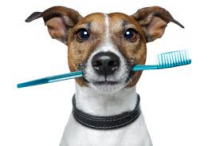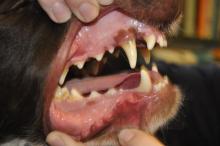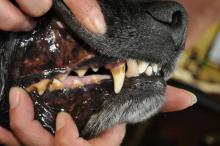Approximately 75% of our pets will need veterinary dental treatment within their lifetime. This number need not be so high...start dental hygiene early. We recommend training puppies and kittens to accept tooth brushing as part of their daily routine. Brushing your pets teeth isn’t as difficult as it sounds! The majority enthusiastically accept brushing when introduced to it slowly and as a positive experience. It needs to become as routine as doing your own teeth! But don’t despair – adult animals (especially dogs) will readily accept brushing, and if they don’t there are other options to try to maintain good oral health.
At St Boniface Vets, dental hygiene is one of our top priorities. The vets constantly monitor your pets oral health by examining your pet’s mouth as part of a puppy or kitten check, again when they are 6 months of age and then at every annual health check with a vaccination. Hopefully this will allow us to detect the first signs of a dental problem and put measures in place to correct it.
These checks are extremely important, as not all animals show obvious signs of pain. A common misconception is the pets appetite will be affected. Sometimes this is the case – but usually only with very severe dental pain – the instinct to continue to eat is extremely strong. Halitosis (bad breath) is the most common finding. Sometimes a pet will dribble (especially cats) and their eating habits may change, a preference to wet food instead of dry may occur; for example, sometimes people assume that if their cat is still hunting then they can’t have oral pain – this is not always the case!
If your pet really can’t be persuaded to have their teeth brushed there are alternatives:
If they will tolerate your fingers in their mouths, but not actual brushing, then applying gel to the teeth and gums will be better than nothing. We recommend Dentisept or Logic gel.
Logic Orozyme chews are palatable and have an enzyme system to help reduce plaque build up. Unlike a lot of other dental chews these are only 1.5% fat so are a much healthier option for your pet.
If they won’t allow any form of intervention in their mouth, then consider using Plaque off. This is a seaweed based product that goes in with their food, and has been shown in a study of beagles to reduce halitosis, plaque and gingival inflammation compared to a controled group of dogs.
Don’t forget diet. This is an extremely important factor in dental disease. Royal Canin dental food is particularly effective at reducing plaque and tartar build up, and stopping it from coming back after a dental clean by the vet. In mild cases, just using a dental formulation can be enough to remove tartar and plaque build up and you may be able to avoid a general anaesthetic for your pet.
If your pet does develop dental disease, it will need to undergo a general anaesthetic for a full scale and polish to remove the tartar. Any diseased or lose teeth can then be viewed and extracted. A general anaesthetic in older pets is not ideal so if we can prevent this with good oral hygiene it is better for everyone!
Call the practice to discuss your pets dental health in more detail - 01363 772860.




